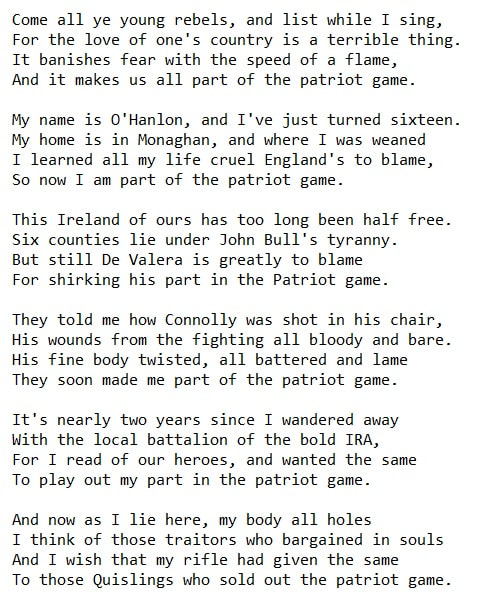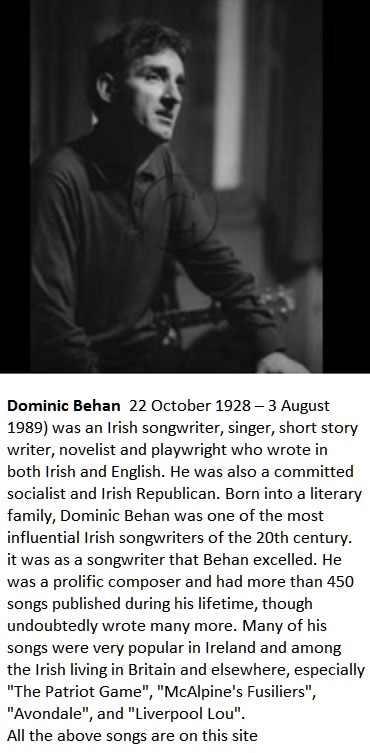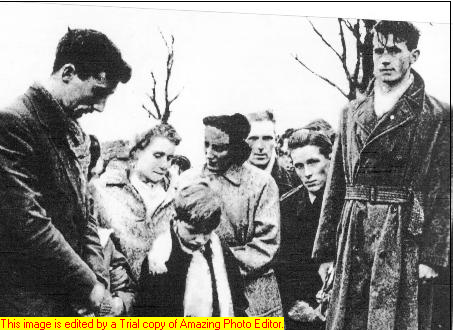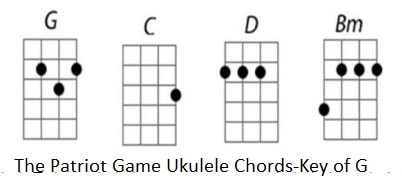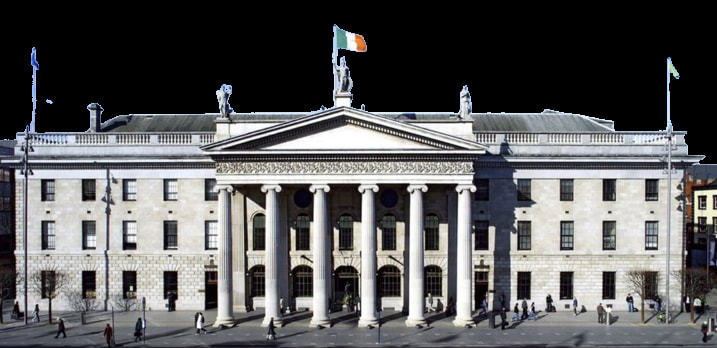The Patriot Game Lyrics And Chords
Written By singer / songwriter Dominic Behan. An Irish Rebel ballad. This song is about Fergus O Hanlon from Ballybay Co.Monaghan who was killed in an ambush in Brookorough R.U.C station along side Sean South [ lyrics ] from Limerick. O' Hanlon was 20 years old. Recorded by The Clancy Brothers And Tommy Makem and by The Wolfe Tones. Many other songs that are related to Co. Monaghan include On Raglan Road [ song lyrics ] which was written by native poet Patrick Kavanagh.
The Patriot Game is a powerful and iconic Irish folk song that has been a symbol of resistance and rebellion for generations. Composed by Dominic Behan in the 1950s, the song has evolved from a simple protest against British rule in Ireland to a timeless symbol of national pride and determination. Its haunting melody and powerful lyrics have captured the hearts and minds of countless individuals and have become an integral part of Irish culture.
The origins of The Patriot Game can be traced back to the Irish struggle for independence from British rule in the early 20th century. The song was written by Dominic Behan, a renowned Irish folk singer and songwriter, in the 1950s. At the time, Ireland was still reeling from the aftermath of the Easter Rising of 1916 and the subsequent War of Independence. The country was divided between those who wanted complete independence from British rule and those who were content with the limited autonomy granted by the Anglo-Irish Treaty of 1921. Behan, a staunch Republican and a member of the IRA (Irish Republican Army), was inspired by the ongoing struggle and wrote The Patriot Game as a call to arms for his fellow Irishmen.
The lyrics of The Patriot Game are a poignant and powerful reflection of the Irish struggle for independence. The song tells the story of a young man who is forced to leave his home and family to join the fight for his country’s freedom. The opening lines “Come all ye young rebels, and list while I sing / For the love of one’s country is a terrible thing” set the tone for the rest of the song. Behan’s lyrics are a stark reminder of the sacrifices made by those who fought for Ireland’s independence and the price they paid for their patriotism. The chorus, with its repeated refrain of “And I loved my dear country, where the wildflowers do bloom / Went out to its own freedom, and died in the bloom”, captures the sentiment of the Irish people who were willing to lay down their lives for the cause of independence.
The Patriot Game quickly gained popularity among the Irish people and became an anthem for the Republican movement. Its powerful lyrics and catchy melody made it a staple at political rallies and protests, where it was sung with fervor and passion. The song’s popularity was further fueled by the emergence of the folk revival movement in the 1960s, which saw a resurgence of interest in traditional Irish music and culture. The Patriot Game, with its strong nationalist message and traditional folk sound, became an instant classic and was recorded by numerous artists, including The Dubliners, The Clancy Brothers, and Sinead O’Connor.
One of the most significant moments in the history of The Patriot Game came during the height of the Troubles in Northern Ireland. In 1972, the song was banned by the BBC for its perceived political content and association with the Republican movement. This only served to increase its popularity and cement its status as a symbol of resistance and rebellion. The song was also banned in the Republic of Ireland by the state broadcaster, RTÉ, for fear of inciting violence. However, The Patriot Game continued to be sung and embraced by the Irish people, especially those in the North who were fighting for their own version of independence.
The Patriot Game has also gained international recognition and has been covered by artists from all over the world. In the United States, the song was popularized by folk singer Joan Baez, who recorded a version of it in 1963. The song has also been translated into other languages, including Spanish, French, and German, and has been used as a rallying cry for various other independence movements around the world.
One of the most remarkable aspects of The Patriot Game is its enduring relevance. Despite being written over half a century ago, the song’s message of resistance and sacrifice still resonates with people today. It has become a symbol of Irish identity and pride, and its lyrics continue to inspire and unite people in their fight against oppression and injustice. The Patriot Game has also transcended its original context and has become a universal anthem for all those who strive for freedom and self-determination.
In conclusion, The Patriot Game is much more than just a song. It is a powerful and enduring symbol of resistance, sacrifice, and national pride. Its lyrics and melody have captured the hearts and minds of generations of Irish people and have become an integral part of their cultural identity. The song’s impact and influence continue to be felt today, and it will undoubtedly remain a timeless symbol of the Irish struggle for independence for many years to come.
The origins of The Patriot Game can be traced back to the Irish struggle for independence from British rule in the early 20th century. The song was written by Dominic Behan, a renowned Irish folk singer and songwriter, in the 1950s. At the time, Ireland was still reeling from the aftermath of the Easter Rising of 1916 and the subsequent War of Independence. The country was divided between those who wanted complete independence from British rule and those who were content with the limited autonomy granted by the Anglo-Irish Treaty of 1921. Behan, a staunch Republican and a member of the IRA (Irish Republican Army), was inspired by the ongoing struggle and wrote The Patriot Game as a call to arms for his fellow Irishmen.
The lyrics of The Patriot Game are a poignant and powerful reflection of the Irish struggle for independence. The song tells the story of a young man who is forced to leave his home and family to join the fight for his country’s freedom. The opening lines “Come all ye young rebels, and list while I sing / For the love of one’s country is a terrible thing” set the tone for the rest of the song. Behan’s lyrics are a stark reminder of the sacrifices made by those who fought for Ireland’s independence and the price they paid for their patriotism. The chorus, with its repeated refrain of “And I loved my dear country, where the wildflowers do bloom / Went out to its own freedom, and died in the bloom”, captures the sentiment of the Irish people who were willing to lay down their lives for the cause of independence.
The Patriot Game quickly gained popularity among the Irish people and became an anthem for the Republican movement. Its powerful lyrics and catchy melody made it a staple at political rallies and protests, where it was sung with fervor and passion. The song’s popularity was further fueled by the emergence of the folk revival movement in the 1960s, which saw a resurgence of interest in traditional Irish music and culture. The Patriot Game, with its strong nationalist message and traditional folk sound, became an instant classic and was recorded by numerous artists, including The Dubliners, The Clancy Brothers, and Sinead O’Connor.
One of the most significant moments in the history of The Patriot Game came during the height of the Troubles in Northern Ireland. In 1972, the song was banned by the BBC for its perceived political content and association with the Republican movement. This only served to increase its popularity and cement its status as a symbol of resistance and rebellion. The song was also banned in the Republic of Ireland by the state broadcaster, RTÉ, for fear of inciting violence. However, The Patriot Game continued to be sung and embraced by the Irish people, especially those in the North who were fighting for their own version of independence.
The Patriot Game has also gained international recognition and has been covered by artists from all over the world. In the United States, the song was popularized by folk singer Joan Baez, who recorded a version of it in 1963. The song has also been translated into other languages, including Spanish, French, and German, and has been used as a rallying cry for various other independence movements around the world.
One of the most remarkable aspects of The Patriot Game is its enduring relevance. Despite being written over half a century ago, the song’s message of resistance and sacrifice still resonates with people today. It has become a symbol of Irish identity and pride, and its lyrics continue to inspire and unite people in their fight against oppression and injustice. The Patriot Game has also transcended its original context and has become a universal anthem for all those who strive for freedom and self-determination.
In conclusion, The Patriot Game is much more than just a song. It is a powerful and enduring symbol of resistance, sacrifice, and national pride. Its lyrics and melody have captured the hearts and minds of generations of Irish people and have become an integral part of their cultural identity. The song’s impact and influence continue to be felt today, and it will undoubtedly remain a timeless symbol of the Irish struggle for independence for many years to come.
|
[G]Come all ye young[C] re[G]bels, and[D] list while I [G]sing,
For the[C] love of one's[G] country is a[Bm] terrible [G]thing. It[C] banishes fear with the[Bm] speed of a[G] flame, And it makes us all [C]part of the[D] patriot[G] game. My name is O'Hanlon, and I've just turned sixteen. My home is in Monaghan, and where I was weaned I learned all my life cruel England's to blame, So now I am part of the patriot game. This Ireland of ours has too long been half free. Six counties lie under John Bull's tyranny. But still De Valera is greatly to blame For shirking his part in the Patriot game. They told me how Connolly was shot in his chair, His wounds from the fighting all bloody and bare. His fine body twisted, all battered and lame They soon made me part of the patriot game. It's nearly two years since I wandered away With the local battalion of the bold IRA, For I read of our heroes, and wanted the same To play out my part in the patriot game. And now as I lie here, my body all holes I think of those traitors who bargained in souls And I wish that my rifle had given the same To those Quislings who sold out the patriot game. Here's the guitar chords for the key of D.
[D]Come all ye young[G] re[D]bels, and[A] list while I [D]sing, For the[G] love of one's[D] country is a[F#m] terrible [D]thing. It[G] banishes fear with the[F#m] speed of a[D] flame, And it makes us all [G]part of the[A] patriot[D] game. |
|
Although Fergal had being on training service in Dublin for two years before, this was his first active service. Fergal had being injured badly in the ambush from the machine gun being fired from the top window of the R.U.C. station.
He had being giving cover from the back of the lorry to two other volunteers who were placing bombs at the front of the barracks, Sean South and others were alongside him were badly wounded.
South was shot in the back. The two bombs failed to explode. With gun fire coming from several directions it was decided to retreat. They made there way out of town to an old farm building.
Here is where Sean South and Fergal O'Hanlon were left, their wounds were so bad there was no chance they would have survived, The walking wounded made their escape across fields and mountains for 7 miles until the reached Co. Monaghan in The Republic Of Ireland.
At 8am next morning the R.I.C. recovered the bodies from the farm building. Both Fergal and Sean were given I.R.A. funerals.
He had being giving cover from the back of the lorry to two other volunteers who were placing bombs at the front of the barracks, Sean South and others were alongside him were badly wounded.
South was shot in the back. The two bombs failed to explode. With gun fire coming from several directions it was decided to retreat. They made there way out of town to an old farm building.
Here is where Sean South and Fergal O'Hanlon were left, their wounds were so bad there was no chance they would have survived, The walking wounded made their escape across fields and mountains for 7 miles until the reached Co. Monaghan in The Republic Of Ireland.
At 8am next morning the R.I.C. recovered the bodies from the farm building. Both Fergal and Sean were given I.R.A. funerals.
